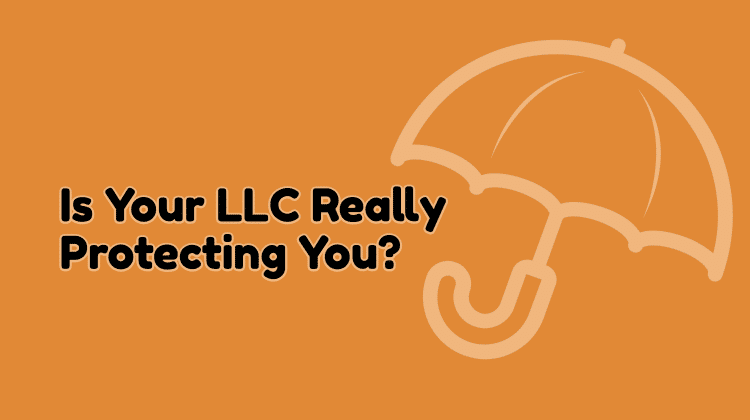
You may think that your limited liability company (LLC) will limit your personal liability if someone sues your company, but will it? In reality, this liability protection can be breached purely based on the way you run the company.
If there are multiple members in the LLC and one member exposes the company to liability, are all the other members protected in their personal assets? Will a court limit any claims strictly to member contributions, or will it reach behind the protections you think you have and come for your home, your spouse’s income, or any other personal asset?
A court can “pierce the veil” of your LLC protection if it determines fraudulent intent or activity, either through lack of funding in starting the company or lack of care in running the business. The single-member LLC and the small family-owned LLC are the most common business entities exposed to personal liability in this way.
What are the holes in your liability protection, and how can you close them?
What the Court Looks For
Courts rely on two main principles to pierce a company’s veil: lack of adequate capitalization and using the company as your “alter ego” in name only while pursuing personal gain, as a front for your personal affairs. Ultimately, a court is looking for fraud, and there are several common indicators that can trigger that appearance.
Here are some common chinks in your armor that will expose you to danger. See if you recognize any of these factors in your own business.
- Did you contribute enough money into the LLC when you formed it, a realistic amount to run the business?
- Have you bought or rented goods or services and now can’t pay a vendor’s bill?
- Are you current with all the filings required by the state (or states) the LLC is registered in?
- Did you secure business credit without the ability to pay back the debt or by making a false representation?
- Has the company paid income to its members that leaves insufficient funds to pay debts?
- Do you make business payments from your personal account or pay personal bills with company checks?
- Do you keep company records, including minutes of any meetings and company decisions?
- Do you hold the meetings required by your LLC operating agreement?
- Is one member of the LLC the leader of the group, making arbitrary decisions without consulting other members?
How to Stay Safe
To protect your personal assets from liability arising out of your business, you should be diligent in keeping business actions strictly separate from personal matters. You must avoid commingling funds, blurring company roles and responsibilities, and acting recklessly with money and credit. You should keep a clear paper trail of company actions.
Pay attention to the legal requirements placed on your LLC by the state. Be sure to file your statements as required, and keep licenses and any required permits and documents current.
Also, if you’re a single-member LLC, you should know how your state regards a single-member LLC, since the states have different laws regarding this business entity. Will your state accord you the same liability protection as a multi-member LLC?
Commingling funds is one of the more common errors made by small companies. Don’t deposit revenues into a personal account. Don’t use company checks to pay personal obligations. Don’t pay company bills with your personal check.
This doesn’t mean you can’t move money around as needed. You can make added contributions to your LLC, and you can make disbursements to yourself as a member. You can be paid a salary. But all this must happen formally on paper and according the terms of your operating agreement.
If it requires a meeting of the members to approve such things, then be sure to hold one, keeping minutes and recording decisions. If actions should be taken by certain persons, make sure they’re the ones to take them.
A paper trail is similarly important with expenses incurred for business reasons and the use of shared assets such as a vehicle. You can share assets for mixed purposes, but you must keep them separate with written reimbursements and claims, mileage logs, and all the records that would exist if you were simply an employee of someone else’s company.
It’s easy for a small-family or single-member LLC to be casual with these paperwork aspects of running the business. You certainly may not need meticulous records just to manage your business affairs, but you should remind yourself what’s at stake―you’re maintaining a paper trail to preserve your liability protection.
About the Author
Karen Huser is one of the founders of SunDoc Filings, a California-based company that helps entrepreneurs with their business filings in any U.S. state.